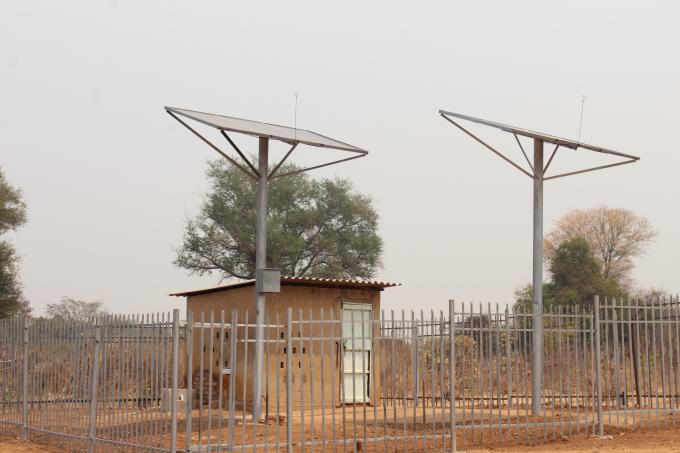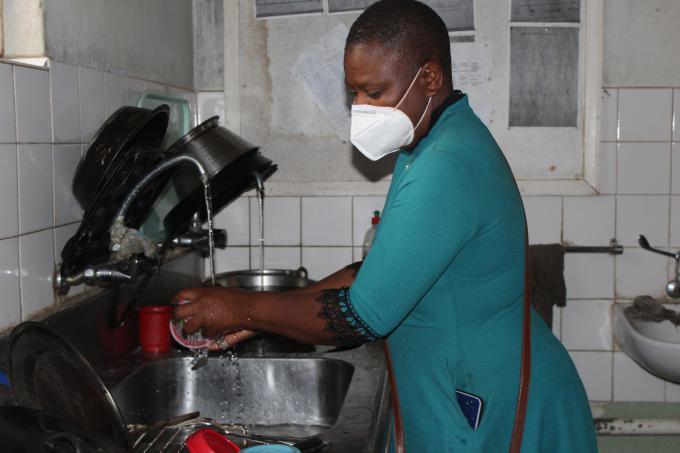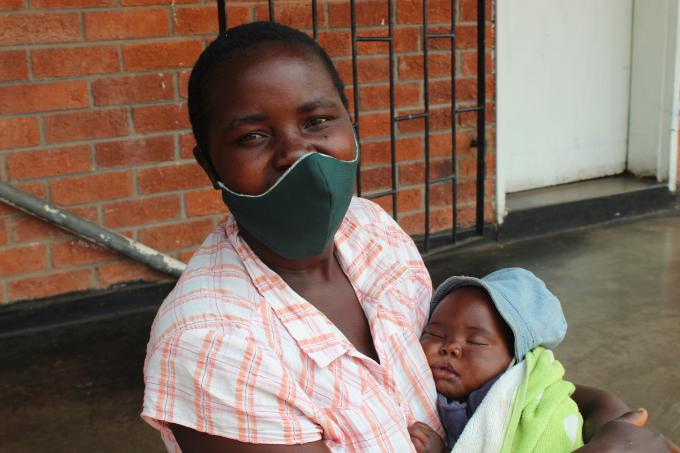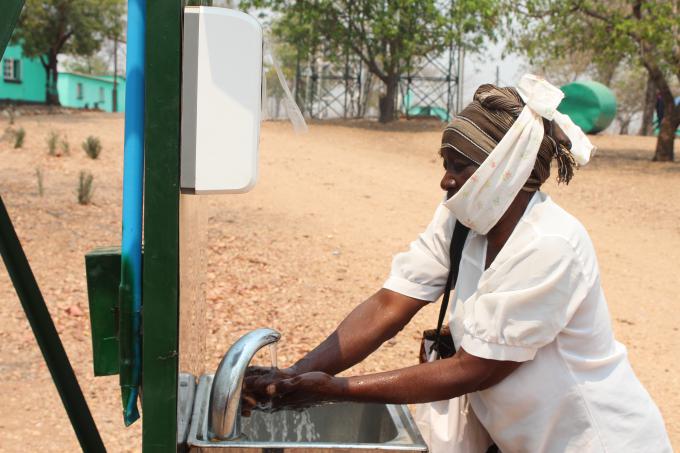Supporting Sustainable Water Service Delivery in Zimbabwe
Ruth, (32), had to walk about two kilometres to the borehole and another two kilometres back, twice a day to fetch 40 litres of water for drinking, cooking, laundry and personal hygiene during her stay at the waiting mothers shelter.
The shelter where Ruth stayed before delivering her baby who is now two-months-old is situated at Msampakaruma Rural Heath Centre. It houses pregnant mothers for a month, while they wait for their delivery date. This is meant to reduce home deliveries and to avoid last minute efforts to get transport to the clinic as there are no ambulances in most rural areas. Like Ruth, all pregnant mothers who were staying at the waiting mothers’ shelter had to bear the burden of walking long distances to fetch water as there was no water at the clinic.
Ruth said, “I am really happy. I am thankful to Save the Children for installing piped water at the clinic. During my stay here, there was no water and I travelled long distances to fetch water for use. It was one of the most painful and exhausting experiences I went through when I was pregnant.” “It’s hard for a pregnant woman to do such a task but I had to be strong because there was no other option. I would fetch water in the morning and evening but the water was not enough. It was difficult to practise good hygiene because you’ll be trying to save up some water.”
“It is a good thing we now have water at the clinic. Now, even when I bring my baby to the clinic for check-ups, I don’t go home thirsty and I can wash my hands anytime.”
MSAMPAKARUMA PIPED WATER SCHEME
Msampakaruma clinic which has been in existence for more than 30 years is one of the busiest health facilities in Nyaminyami district, and serves a population of about 7,067 people. The clinic also admits an average of 18 pregnant mothers into the waiting mothers’ shelter and conducts about 20 deliveries every month. The clinic had no water for more than 15 years after the piped water system broke down due to poor maintenance.
Both staff members and patients had to fetch water from a community borehole which is approximately two kilometres away from the clinic. In July 2020, a solar powered piped water scheme was installed at Msampakaruma clinic under Save the Children’s WASH programme which is being supported by a private trust. The programme came as a relief to the clinic staff members, patients, waiting mothers and the community at large, because not only did it save them from travelling long insecure distances to fetch water but it also meant they finally had clean water.
The solar powered submersible pump, feeds water into two, 10 000 litre tanks stationed at the clinic which then supply water to three taps fitted around the clinic. The water pipes which were installed cover a distance of 2 kilometres from the pump to the clinic.

Angeline Siadembe, Nurse-In-Charge at Msampakaruma Clinic says that unavailability of water hindered the institution’s ability to run day to day duties and to provide quality health services.
“It was difficult to conduct deliveries as we would use buckets to fetch water from the nearby borehole which is not so near and put it into the labour ward. Sometimes, we would conduct four to five deliveries during the night. After conducting those deliveries, we would pack away all the dirty materials which would only be washed when community members came to fetch water for the clinic.”
Apart from the water taps that were installed at the clinic, two taps were installed at Msampakaruma primary and secondary school, respectively. Another water tap was fitted at the nutrition garden where waiting mothers grow vegetables, which help improve their dietary requirements.
SIAKOBVU PIPED WATER SCHEME
Siakobvu Hospital is Nyaminyami district’s referral hospital which also services about 2,687 people from the local community. It also attends to referrals from six neighbouring clinics. The hospital is the COVID-19 isolation centre for the district and also home to Siakobvu waiting mothers shelter where an average of twenty pregnant mothers are admitted every month.
For the past 3 years, the hospital’s water taps have been dry. Zimbabwe National Water Authority (ZINWA) used to supply water to the hospital through an electrically powered pump. However, the district suffers inconsistencies in electricity supply and this means the water pump is not powered. Since 2018, electricity was cut-off hence ZINWA could not supply water.
The hospital has been using an ambulance to ferry volumes of water from a borehole which is located four kilometres away from the clinic. Sometimes, the ambulance would run out of fuel or the borehole owners would refuse with their water and the hospital would opt to fetch water from an unprotected spring which is located about two kilometres from the hospital.
Pregnant mothers at Siakobvu hospital waiting mothers’ shelter also endured the long walk to fetch water at the spring and this posed health risks to the mother and the unborn baby. The strain of caring a heavy load of water and walking uphill was unbearable, and there was the risk of getting sick from drinking water from an unprotected source.
Unavailability of water has had a huge toll on the hospital’s operations especially in the labour ward. There wasn’t enough water to clean up the labour ward during and after deliveries and this put staff members, mothers and their new born babies at risk of contracting infections.
Like Msampakaruma clinic, Siakobvu hospital now accesses clean running water within the institution’s compound since July 2020. Under Save the Children’s WASH programme, Siakobvu borehole which broke down some years ago was rehabilitated and a solar powered submersible pump which pumps water from the borehole to tanks via water pipes which cover a distance of 350 metres was installed.
Two, 10 000 litre tanks were mounted to store water pumped from the borehole and supply to the hospital’s water points. Lameck, Siakobvu Hospital Administrator explained the hospital’s status after piped water was installed.
“We now have clean water running out of all hospital taps, from the kitchen, labour ward, bathrooms and toilets. We no longer have to ferry water from the distant borehole and our staff and patients are now at ease, knowing that their health is secured.”

Community members who had to fetch water at the open spring now have access to clean safe water as a water tap was installed at the community centre.
FIGHTING COVID-19
The two piped water systems installed in Nyaminyami district have been critical in fighting COVID-19 as hand washing is said to be like a “do-it-yourself’’ vaccine. Water points stationed around the health facilities, schools and community will help in improving hygiene practices among people in the district hence reducing the risk of contracting COVID-19.
Lameck of Siakobvu hospital explained that the institution had been condemned by the community and nurses also threatened to down tools as they felt their health was being compromised by continuing to work without adequate water for hand washing, amid the COVID-19 pandemic.
“Patients were now scared to visit the hospital for treatment as they feared they would contract coronavirus. It was difficult to teach people about the importance of washing hands as we were incapacitated to provide water or handwashing services as an institution. Our nurses wanted to strike as they were scared of getting infected too.”
To reduce the risk of transmission, Save the Children through funding from OFDA, installed contactless handwashing facilities at the entry points of Msampakaruma Health Centre and Siakobvu Hospital. The handwashing stations each have 1 000 litre water storage tanks, automatic soap dispenser and an automatic water dispenser which is connected to the solar powered piped water schemes. Staff members and all visitors to the two facilities now wash their hands at the gate before proceeding to the health facilities’ compounds.
Gogo Anna joyfully spoke about how the programme has benefited her community “I am happy about the great work that was done in our community by Save the Children. We used to drink unsafe water but now we drink clean water and we don’t even have to walk long distances to fetch water. Our hospital now has clean water running from taps close-by and we can wash our hands anytime without fearing that the water might get finished.’’
 Zimbabwe
Zimbabwe 
